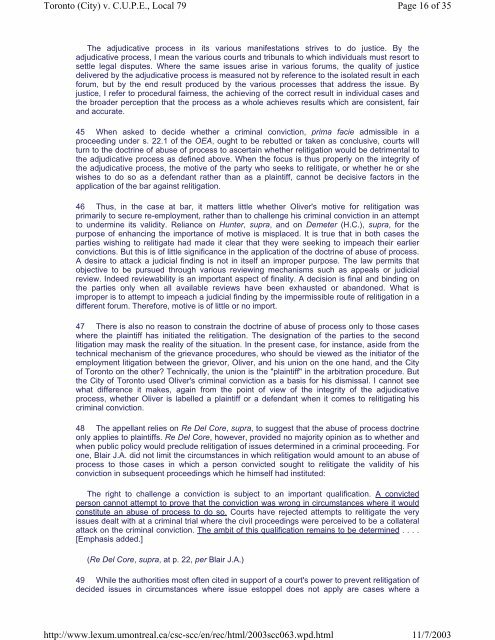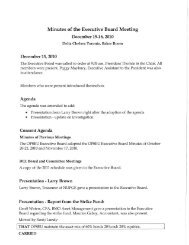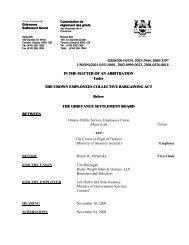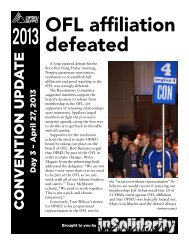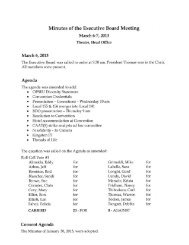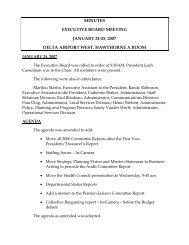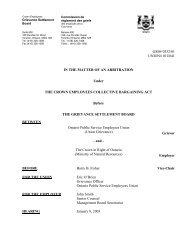C.U.P.E., Local 79 v. Toronto (City) .pdf - OPSEU
C.U.P.E., Local 79 v. Toronto (City) .pdf - OPSEU
C.U.P.E., Local 79 v. Toronto (City) .pdf - OPSEU
You also want an ePaper? Increase the reach of your titles
YUMPU automatically turns print PDFs into web optimized ePapers that Google loves.
<strong>Toronto</strong> (<strong>City</strong>) v. C.U.P.E., <strong>Local</strong> <strong>79</strong><br />
http://www.lexum.umontreal.ca/csc-scc/en/rec/html/2003scc063.wpd.html<br />
Page 16 of 35<br />
11/7/2003<br />
The adjudicative process in its various manifestations strives to do justice. By the<br />
adjudicative process, I mean the various courts and tribunals to which individuals must resort to<br />
settle legal disputes. Where the same issues arise in various forums, the quality of justice<br />
delivered by the adjudicative process is measured not by reference to the isolated result in each<br />
forum, but by the end result produced by the various processes that address the issue. By<br />
justice, I refer to procedural fairness, the achieving of the correct result in individual cases and<br />
the broader perception that the process as a whole achieves results which are consistent, fair<br />
and accurate.<br />
45 When asked to decide whether a criminal conviction, prima facie admissible in a<br />
proceeding under s. 22.1 of the OEA, ought to be rebutted or taken as conclusive, courts will<br />
turn to the doctrine of abuse of process to ascertain whether relitigation would be detrimental to<br />
the adjudicative process as defined above. When the focus is thus properly on the integrity of<br />
the adjudicative process, the motive of the party who seeks to relitigate, or whether he or she<br />
wishes to do so as a defendant rather than as a plaintiff, cannot be decisive factors in the<br />
application of the bar against relitigation.<br />
46 Thus, in the case at bar, it matters little whether Oliver's motive for relitigation was<br />
primarily to secure re-employment, rather than to challenge his criminal conviction in an attempt<br />
to undermine its validity. Reliance on Hunter, supra, and on Demeter (H.C.), supra, for the<br />
purpose of enhancing the importance of motive is misplaced. It is true that in both cases the<br />
parties wishing to relitigate had made it clear that they were seeking to impeach their earlier<br />
convictions. But this is of little significance in the application of the doctrine of abuse of process.<br />
A desire to attack a judicial finding is not in itself an improper purpose. The law permits that<br />
objective to be pursued through various reviewing mechanisms such as appeals or judicial<br />
review. Indeed reviewability is an important aspect of finality. A decision is final and binding on<br />
the parties only when all available reviews have been exhausted or abandoned. What is<br />
improper is to attempt to impeach a judicial finding by the impermissible route of relitigation in a<br />
different forum. Therefore, motive is of little or no import.<br />
47 There is also no reason to constrain the doctrine of abuse of process only to those cases<br />
where the plaintiff has initiated the relitigation. The designation of the parties to the second<br />
litigation may mask the reality of the situation. In the present case, for instance, aside from the<br />
technical mechanism of the grievance procedures, who should be viewed as the initiator of the<br />
employment litigation between the grievor, Oliver, and his union on the one hand, and the <strong>City</strong><br />
of <strong>Toronto</strong> on the other Technically, the union is the "plaintiff" in the arbitration procedure. But<br />
the <strong>City</strong> of <strong>Toronto</strong> used Oliver's criminal conviction as a basis for his dismissal. I cannot see<br />
what difference it makes, again from the point of view of the integrity of the adjudicative<br />
process, whether Oliver is labelled a plaintiff or a defendant when it comes to relitigating his<br />
criminal conviction.<br />
48 The appellant relies on Re Del Core, supra, to suggest that the abuse of process doctrine<br />
only applies to plaintiffs. Re Del Core, however, provided no majority opinion as to whether and<br />
when public policy would preclude relitigation of issues determined in a criminal proceeding. For<br />
one, Blair J.A. did not limit the circumstances in which relitigation would amount to an abuse of<br />
process to those cases in which a person convicted sought to relitigate the validity of his<br />
conviction in subsequent proceedings which he himself had instituted:<br />
The right to challenge a conviction is subject to an important qualification. A convicted<br />
person cannot attempt to prove that the conviction was wrong in circumstances where it would<br />
constitute an abuse of process to do so. Courts have rejected attempts to relitigate the very<br />
issues dealt with at a criminal trial where the civil proceedings were perceived to be a collateral<br />
attack on the criminal conviction. The ambit of this qualification remains to be determined . . . .<br />
[Emphasis added.]<br />
(Re Del Core, supra, at p. 22, per Blair J.A.)<br />
49 While the authorities most often cited in support of a court's power to prevent relitigation of<br />
decided issues in circumstances where issue estoppel does not apply are cases where a


